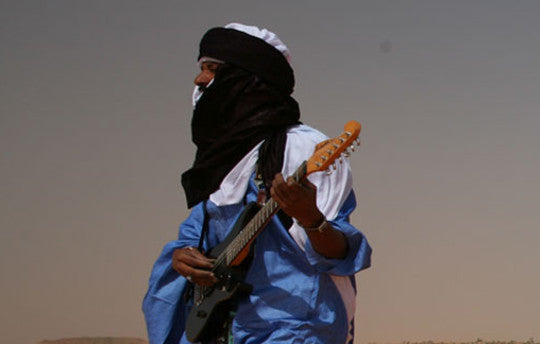Your Cart is Empty

 The Saharan sand coats your clothes and drenches your hair. You can taste it in the food. It wreaks havoc with electronic items. Everyone covers their gadgets with sheets of plastic, but they still break down quickly. With temperatures that top 40°C (105°F) almost every day, it is one of the world’s harsh environments. The heat and sand also shape the region’s music. The Desert Blues, the folk music of the Sahara, is a part of this experience, and if you listen carefully you’ll hear the sand in the voices, and even the instruments.
The Saharan sand coats your clothes and drenches your hair. You can taste it in the food. It wreaks havoc with electronic items. Everyone covers their gadgets with sheets of plastic, but they still break down quickly. With temperatures that top 40°C (105°F) almost every day, it is one of the world’s harsh environments. The heat and sand also shape the region’s music. The Desert Blues, the folk music of the Sahara, is a part of this experience, and if you listen carefully you’ll hear the sand in the voices, and even the instruments.
The political map shows Saharan nations such as Mali, Mauritania, Morocco, Tunisia, Algeria, Niger, Chad, Egypt and Libya, while the cultural map is shaped by various ethnic groups, including Tuareg, Moor, Berber, Peul, Dogon and Songhai, and it is their songs, and their stories, that create the Desert Blues.
The Desert Blues are tales of exile and the longing to return to a homeland. Some are folk songs that have been passed down for generations. Others are born in refugee camps, dreams of political aspirations.
‘We've been playing this music for hundreds of years,’ Ali Farke Touré once told me when I met him at his Malian office. ‘The guys in Mississippi are playing “American-Malian music”, not the other way around.’ The blues, like scores of musical forms in the Americas, can trace their roots directly to Africa.
The earliest origins of American blues can be found in African-American work songs and field hollers that date back to the time of slavery, as well as similar styles of melismatic singing styles (several notes sung on one syllable) rooted in West Africa. American blues can also be traced to a West African traditional instrument called the akonting, a precursor to the modern banjo. In the twentieth century, American blues recordings from artists like John Lee Hooker and Muddy Waters made their way back across the Atlantic and played a role in modern West African guitar styles (similar to how Afro-Cuban son influenced Congolese soukous). Still, there is no doubt that, when you listen to the guitar styles of Ali Farka Touré, Tinariwen and countless other artists, West Africa is the source of what we now know as blues.
The themes in American blues are synonymous with the African-American experience: floods, discrimination, lost love, and even slavery, as documented in early work songs that Alan Lomax recorded in southern prisons (a modern incarnation of slavery). Christian gospel music also played a key role in the evolution of American blues. Ed Morales notes that the West African Yoruba culture was present in early blues, as Robert Johnson’s ‘Cross Road Blues’ refers to Eleggua, the Orisha (god) of the crossroads. Similar themes can be found in the source, Africa’s Desert Blues. The music written in the Tuareg and Sahrawi refugee camps deal with similar experiences: exile, persecution and isolation. In recent years, the songs of the Tuareg have managed to escape these refugee camps, and have attracted millions of adoring followers worldwide, including Robert Plant and Carlos Santana. Few outside of the Sahara speak languages like Tamasheq. However, their musical appeal goes beyond language, as these Desert Blues songs, like their cousins in America, represent a universal language. The music, born in the harsh Saharan sand, indeed reflects universal experiences: the pain and suffering of lives removed from a homeland, and the dreams and longing for return. These are the dreams that bring countless thousands from all corners of the world to the Sahara’s harshest sands every year, to Mali’s Festival In The Desert – the musical Mecca for Tuareg music and other forms of Desert Blues… So, if you’ve had your immunizations, and are ready for the musical trip of your life, it’s truly an event not to be missed. If you can’t make it, we’ve got the next best thing: The Rough Guide To The Desert Blues.
Listen to the album in the store
Etran Finatawa combine the rich, nomadic cultures of the Tuareg and Wodaabe people from the West African country of Niger – a region that for thousands of years has served as a crossroads between the Arabs of North Africa and the sub-Saharan traditions. Etran Finatawa blend traditional instruments with electric guitars, combining the polyphonic songs of the Wodaabe people with modern arrangements, transporting you to the Sahara with their evocative sound.